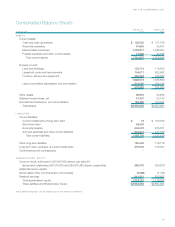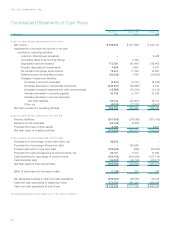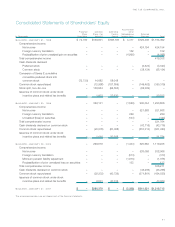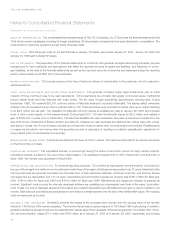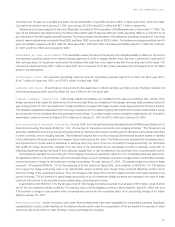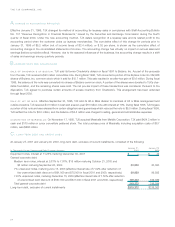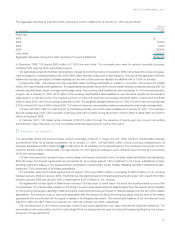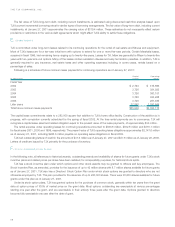TJ Maxx 2000 Annual Report Download - page 7
Download and view the complete annual report
Please find page 7 of the 2000 TJ Maxx annual report below. You can navigate through the pages in the report by either clicking on the pages listed below, or by using the keyword search tool below to find specific information within the annual report.
amortized over 40 years on a straight–line basis. Annual amortization of goodwill was $2.6 million in fiscal years 2001, 2000 and 1999.
Cumulative amortization as of January 27, 2001 and January 29, 2000 was $30.3 million and $27.7 million, respectively.
Tradename is the value assigned to the name “Marshalls” as a result of TJX’s acquisition of the Marshalls chain on November 17, 1995. The
value of the tradename was determined by the discounted present value of assumed after–tax royalty payments, offset by a reduction for its
pro–rata share of the total negative goodwill acquired. The final purchase price allocated to the tradename, including a reduction for a pro–rata
share of reserve adjustments recorded in fiscal 2000 and fiscal 1998, amounted to $128.3 million. The tradename is being amortized over 40
years. Amortization expense was $3.2 million for fiscal years 2001, 2000 and 1999. Cumulative amortization was $17.4 million as of January
27, 2001 and $14.2 million as of January 29, 2000.
IMPAIRMENT OF LONG–LIVED ASSETS: TJX periodically reviews the value of its property and intangible assets in relation to the current
and expected operating results of the related business segments in order to assess whether there has been a permanent impairment of
their carrying values. An impairment exists when the undiscounted cash flow of an asset is less than the carrying cost of that asset. TJX
recorded an impairment loss of $3.1 million in fiscal 2001 as a component of the $6.3 million estimated cost of closing its three T.K. Maxx
stores in the Netherlands.
ADVERTISING COSTS: TJX expenses advertising costs as incurred. Advertising expense was $121.8 million for fiscal year 2001,
$114.7 million for fiscal year 2000, and $106.4 million for fiscal year 1999.
EARNINGS PER SHARE: All earnings per share amounts discussed refer to diluted earnings per share unless otherwise indicated. All
historical earnings per share amounts reflect the June 1998 two–for–one stock split.
FOREIGN CURRENCY TRANSLATION: TJX’s foreign assets and liabilities are translated at the year–end exchange rate. Activity of the
foreign operations that impact the statements of income and cash flows are translated at the average exchange rates prevailing during the
year. A large portion of TJX’s net investment in foreign operations is hedged with foreign currency swap agreements and forward contracts.
The translation adjustments associated with the foreign operations and the related hedging instruments are included in shareholders’ equity
as a component of accumulated other comprehensive income (loss). Cumulative foreign currency translation adjustments, net, included in
shareholders’ equity amounted to losses of $1.6 million as of January 27, 2001 and $1.3 million as of January 29, 2000.
NEW ACCOUNTING STANDARDS (UNAUDITED): During 1998, the Financial Accounting Standards Board (FASB) issued Statement of
Financial Accounting Standards (SFAS) No. 133, “Accounting for Derivative Instruments and Hedging Activities.” This Statement, as
amended, established accounting and reporting standards for derivative instruments, including certain derivative instruments embedded
in other contracts, and for hedging activities. This Statement requires that an entity recognize all derivatives as either assets or liabilities
in the statements of financial position and measure those instruments at fair value. This Statement also requires that companies recog-
nize adjustments to the fair value of derivatives in earnings when they occur, if they do not qualify for hedge accounting. For derivatives
that qualify for hedge accounting, changes in the fair value of the derivatives can be recognized currently in earnings, along with an
offsetting adjustment against the basis of the underlying hedged item, or can be deferred in accumulated other comprehensive income.
This Statement will affect the accounting for TJX’s hedging contracts as described in Note D to the consolidated financial statements.
As described in Note D, TJX periodically enters into forward foreign currency exchange contracts to hedge certain merchandise purchase
commitments and to hedge its net investment in foreign subsidiaries. Through January 27, 2001, TJX applied hedge accounting to these
contracts. TJX adopted SFAS No. 133 at the beginning of its first quarter for fiscal 2002. Upon adoption of SFAS No. 133 TJX elected
not to apply the hedge accounting rules to its merchandise related contracts even though these contracts effectively function as an
economic hedge of the underlying exposure. Thus, the changes in fair value of the inventory related contracts will impact earnings in the
period of change. TJX will continue to apply hedge accounting on its net investment hedge contracts and changes in fair value of these
contracts will continue to be recorded in accumulated other comprehensive income.
In accordance with SFAS No. 133, the fair value of all of TJX’s hedge contracts amounted to a net asset of $10 million, most of which
are for the net investment hedge contracts. The carrying value of all its hedging contracts, before adoption, was $12 million and thus
TJX recorded a charge to accumulated other comprehensive income for the cumulative effect of an accounting change of $2 million
effective January 28, 2001.
RECLASSIFICATIONS: Certain amounts in prior years’ financial statements have been reclassified for comparative purposes. Significant
reclassifications include certain liabilities on the balance sheets and the cash flow presentation of the tax benefit from exercise of stock
options as well as the effect on cash of foreign currency exchange rate changes.
THE TJX COMPANIES, INC.
23



